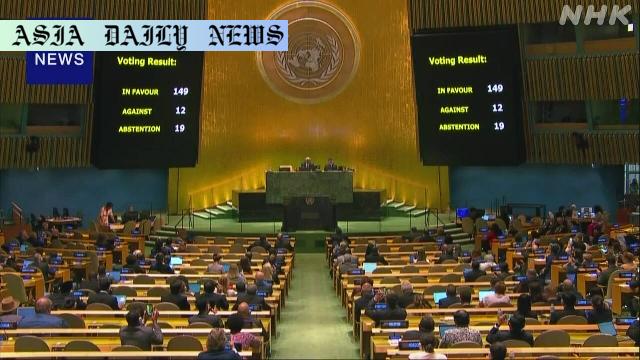Ceasefire: The UN General Assembly demands an unconditional Gaza ceasefire and highlights the critical need for humanitarian responses.
- The UN General Assembly passed a resolution calling for a ceasefire in Gaza.
- The resolution demands hostages’ release and emphasizes civilian protection.
- The US and Israel objected to the resolution for omitting critical condemnations.
- Unlike Security Council resolutions, this non-binding resolution still carries significant moral weight.
- The resolution condemns starvation as a method of warfare and highlights humanitarian responsibilities.

The Importance of the UN Ceasefire Resolution
In an emergency session this Thursday, the United Nations General Assembly demonstrated its commitment to addressing the humanitarian crisis in Gaza. By adopting a resolution that demands an immediate and unconditional ceasefire, it has brought much-needed attention to a dire situation. The General Assembly called for the release of hostages and emphasized the protection of civilians from ongoing violence. Although such resolutions by the General Assembly are non-binding, they carry significant symbolic and moral weight, pressuring nations to act or reconsider their positions on critical issues.
Proposed by over 50 countries and regions, the resolution is a testament to international cooperation and shared concerns about the escalating violence. UN General Assembly President Philemon Yang criticized the Security Council for its inability to resolve the crisis, showcasing the limitations of that body’s current dynamics. This resolution, although symbolic, provides a platform for nations advocating peace and urgent humanitarian responses to make their voices heard on the global stage.
Key Demands and Reactions
One of the resolution’s key provisions was its condemnation of starvation as a method of warfare and its insistence on compliance with international law regarding the distribution of humanitarian aid. It emphasized the occupying power’s responsibility to ensure aid reaches those in need and condemned all acts that prevent this. These clauses aim to address the immediate hardships faced by civilians trapped within conflict zones. Furthermore, the resolution received 149 votes in favor, signaling broad international support for decisive action.
Nevertheless, the resolution was contested by both the United States and Israel, the latter of whom criticized the missing precondition of hostage release before enforcing a ceasefire. The United States opposed the resolution on grounds of failing to explicitly condemn Hamas for its actions. These objections highlight the international community’s divided opinions on prioritizing immediate humanitarian needs versus achieving long-term security concerns.
The Broader Implications
The adoption of this resolution underscores the broader responsibility of global entities to advocate for peace and humanitarian assistance. It also reflects growing frustration with the apparent gridlock at the Security Council. Despite its non-binding nature, resolutions passed by the General Assembly serve an important function of rallying international sentiment and providing a moral compass in navigating complex geopolitical crises. This one, in particular, calls upon all nations to urge for peace, prevent escalation, and mitigate further harm to civilians.
The language within the resolution, such as the emphasis on protecting civilians and upholding international humanitarian law, sets a precedent for how conflicts could be managed in the future. While concrete actions may still depend on powerful national actors, moral messages such as this help keep attention focused on the suffering of those affected and create a framework for accountability.
Moving Forward
The passage of the resolution opens new avenues for dialogue and future negotiations concerning the Gaza Strip. It reiterates the importance of international solidarity in moments of widespread atrocities and serves as a wake-up call for nations that are either complicit or silent in the face of humanitarian crises. As the international community watches closely, it remains imperative that further pressure is applied to ensure the demands for ceasefire and aid are met.
This resolution, though contentious, emphasizes the vital need for peace and the protection of human lives above political disagreements. It remains to be seen how nations and influential actors will interpret and respond to the General Assembly’s message of urgency.



Commentary
Understanding the Representations Behind the Resolution
The United Nations General Assembly’s recent resolution calling for a ceasefire in Gaza represents one of the many complexities surrounding international diplomacy. It’s pivotal to note how important such resolutions, even when non-binding, are in showcasing global sentiment on key humanitarian issues. Although often overshadowed by the more authoritative Security Council, the General Assembly provides a unique venue to present unified stances on morally critical events.
Highlights and Limitations of the Resolution
While the resolution has drawn attention for its strong emphasis on humanitarian responsibility and legal accountability, it cannot be ignored that such measures carry limitations. Countries like Israel and the United States have raised valid points regarding the lack of stipulated terms for dealing with the release of hostages or directly addressing institutional violence initiated by Hamas. Such omissions underscore the difficulty in drafting resolutions that accommodate various stakeholders with diverse political, ethical, and strategic concerns.
A Takeaway for the Global Audience
Ultimately, the most immediate takeaway from this resolution is the reaffirmation of the human cost of prolonged conflicts. Both civilian lives and human dignity are often overshadowed by political discourse, and it is encouraging to see international voices uniting to reprioritize humanity above conflict. However, the political tug-of-war witnessed in the resolution’s adoption highlights the long road ahead for achieving meaningful change. For every victory in consensus, there are areas where progress falls short.
The world must watch closely to ensure such resolutions amplify actions alongside advocacy. While the ceasefire resolution may not be the immediate remedy to Gaza’s plight, it unquestionably sets the tone for the global community to demand peace, humanity, and urgent action.